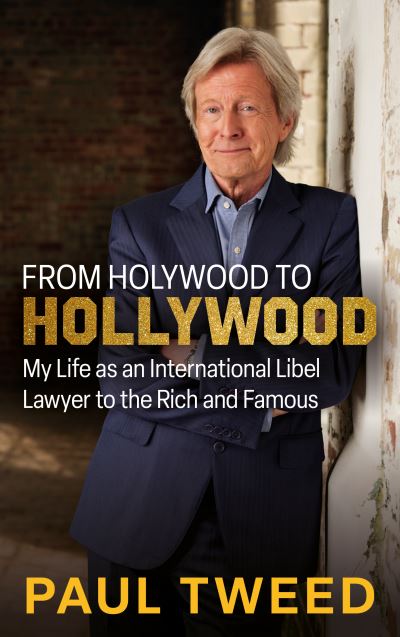Review: Better call Paul – how a Belfast lawyer became a Hollywood hero

Graham Ogilvy reviews Paul Tweed’s new book about his life as an international libel lawyer to the rich and famous.
Paul Tweed is a familiar figure on television and in the newspapers. Representing celebrity clients has made him something of a celebrity himself, and now he tells his story in a new book that will entertain and inform a legal audience and beyond.
In From Holywood to Hollywood, the Belfast lawyer charts his journey from his modest beginnings to becoming one of the world’s best-known defamation lawyers – an amazing feat for a solicitor outwith the big firms in London, New York or California.
Tweed now operates from offices in London and Dublin as well as his home turf of Belfast. But he is careful to acknowledge the Belfast lawyers who mentored, encouraged and inspired him in his early days.
Chief among these is Bob McCartney, who instructed the young lawyer in the famous ‘battle of the buns’ after the Sunday World erroneously reported that two Belfast barristers, McCartney and Des Boal, had fought in a baker’s shop over the last cream bun. The resulting highly-publicised action resulted in an award of £50,000 damages to each, and Tweed was blooded into the world of defamation litigation in which he now excels.
McCartney was responsible for introducing Tweed to Barney Eastwood, Northern Ireland’s legendary boxing promoter, who instructed him in his epic defamation case against his former protégé and World Champion, Barry McGuigan. The ensuing bruising battle resulted in a huge award of £450,000 to Eastwood, and the grateful businessman pushed Paul to the fore in press conferences and media events as well as introducing him to the boxing world.
It was a formative experience for a young solicitor, and Tweed feels that the world of boxing is “not a million miles” from the world of media law: unless a compromise is reached early on, “each case is a fight to the death.”
He adds: “If you don’t strike quickly and effectively against your opponent, they’ll strike quickly and effectively against you.”
More high-profile successful actions for Eastwood followed, making Paul the obvious choice for Liam Neeson, the Northern Irish actor, and his wife Natasha Richardson in an action against Sunday Life. It was, he notes, “a marketing man’s dream” and the gates of Hollywood were opened to the boy from Holywood.
Tweed, who relishes the adrenaline rush of each case, was quick to exploit the opportunity, cross-crossing the Atlantic to build up relationships with US lawyers and A-list clients who valued his effectiveness and easy charm.
In an era of reckless tabloid reporting, Tweed was able to represent Hollywood stars in London and Dublin, where defamation legislation was more receptive to plaintiffs – but he rejects the notion that he was the beneficiary of ‘libel tourism’.
As the newspapers fade away, Tweed is turning his focus on the new digital world of of Twitter and Facebook and the platforms which exploit section 230 of the Communications Decency Act, a US law passed in 1996 that grants these companies immunity from being held liable for ‘third-party’ content – unlike traditional publishers. It is a ridiculous state of affairs that the Belfast lawyer campaigns against.
But knee-jerk tweeters can still find themselves on the receiving end of a Tweed action, as Dr Christian Jessen found out when he responded to an email demanding the retraction of a defamatory tweet about Arlene Foster with “LOL”. A Belfast court subsequently awarded Ms Foster £100,000, allowing her lawyer to dryly observe: “He’s not laughing now.”
This book is not just a memoir; the author looks forward to a rapidly changing media scene in which AI and the big tech companies present new challenges to people wishing to preserve their privacy and reputation.
But for the moment, we’ll give AI the last word. I asked ChatGPT to ‘review’ this book and it came back with: “Tweed’s writing style is engaging, balancing detailed legal insight with a sense of humour and personal reflection. While the book is likely to appeal to those with an interest in media law or celebrity culture, it also offers broader lessons about the power of reputation and the importance of legal protection in the digital age.
“Overall, From Hollywood to Holywood is an informative and entertaining read, offering both a legal and personal narrative of one man’s journey through the evolving landscape of media and defamation law.”
I can’t quibble with that!
From Holywood to Hollywood by Paul Tweed. Published by Merrion Press, 176 pp, €17.99.








